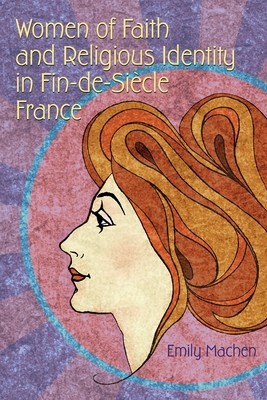
- We will send in 10–14 business days.
- Author: Emily Machen
- Publisher: Syracuse University Press
- ISBN-10: 0815636091
- ISBN-13: 9780815636090
- Format: 15.2 x 22.9 x 1.8 cm, hardcover
- Language: English
- SAVE -10% with code: EXTRA
Women of Faith and Religious Identity in Fin-De-Siècle France (e-book) (used book) | bookbook.eu
Reviews
Description
In this unique study, Machen explores a moment of intense religious upheaval and transformation in France between 1880 and 1920. In these pre-World War I years, a powerful Catholic community was pitted against equally powerful anticlerical members of the French Third Republic. During this time, women became increasingly involved in faith-based organizations, engaging in social and political action both to expand women's rights and to ensure that religion remained part of the public debate about France's identity. By representing their faith communities as modern, progressive, and in some cases democratic, women positioned themselves to help guide a modernizing France.
Women of Catholic, Protestant, and Jewish faiths also reshaped the narrative of female power within the French nation and within their own religious groups. Their activism provided them with social, religious, and political influence unattainable through any other French institutions, enabling them in turn to push France toward becoming a more democratic, equitable society. Machen's timely examination of the critical role women played in shaping the nation's religious identity helps to illuminate contemporary issues in France as Muslim communities respond to civic pressure to secularize and as the country debates the role of women in Islam.EXTRA 10 % discount with code: EXTRA
The promotion ends in 20d.09:12:43
The discount code is valid when purchasing from 10 €. Discounts do not stack.
- Author: Emily Machen
- Publisher: Syracuse University Press
- ISBN-10: 0815636091
- ISBN-13: 9780815636090
- Format: 15.2 x 22.9 x 1.8 cm, hardcover
- Language: English English
In this unique study, Machen explores a moment of intense religious upheaval and transformation in France between 1880 and 1920. In these pre-World War I years, a powerful Catholic community was pitted against equally powerful anticlerical members of the French Third Republic. During this time, women became increasingly involved in faith-based organizations, engaging in social and political action both to expand women's rights and to ensure that religion remained part of the public debate about France's identity. By representing their faith communities as modern, progressive, and in some cases democratic, women positioned themselves to help guide a modernizing France.
Women of Catholic, Protestant, and Jewish faiths also reshaped the narrative of female power within the French nation and within their own religious groups. Their activism provided them with social, religious, and political influence unattainable through any other French institutions, enabling them in turn to push France toward becoming a more democratic, equitable society. Machen's timely examination of the critical role women played in shaping the nation's religious identity helps to illuminate contemporary issues in France as Muslim communities respond to civic pressure to secularize and as the country debates the role of women in Islam.

Reviews